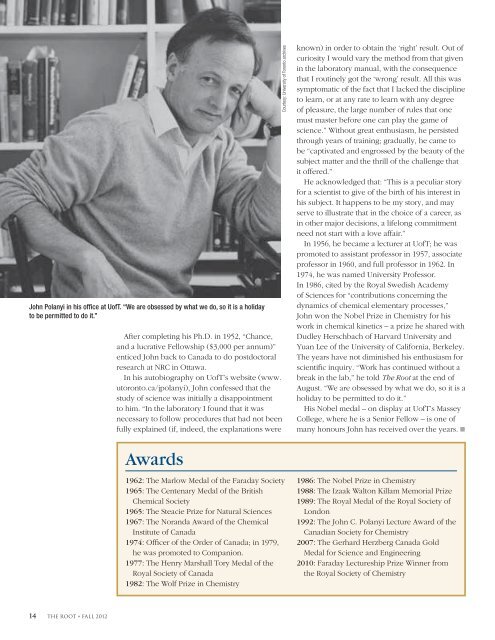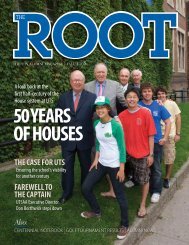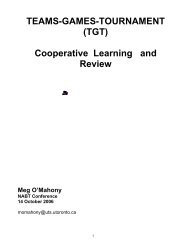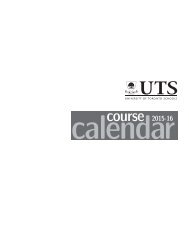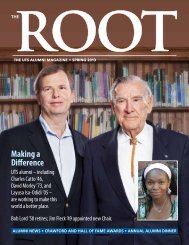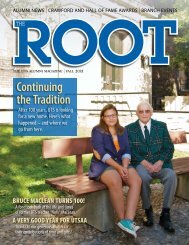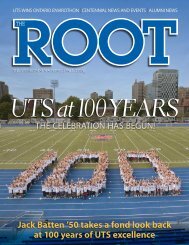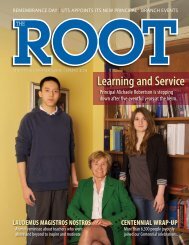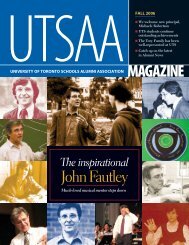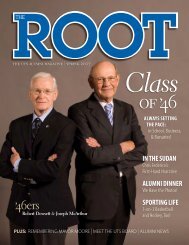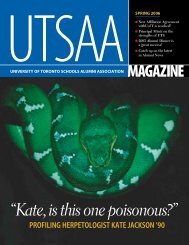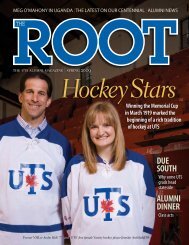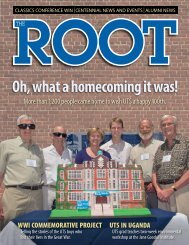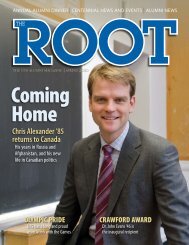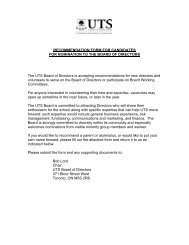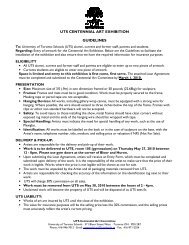Fall 2012 - University of Toronto Schools
Fall 2012 - University of Toronto Schools
Fall 2012 - University of Toronto Schools
You also want an ePaper? Increase the reach of your titles
YUMPU automatically turns print PDFs into web optimized ePapers that Google loves.
John Polanyi in his <strong>of</strong>fice at U<strong>of</strong>T. “We are obsessed by what we do, so it is a holiday<br />
to be permitted to do it.”<br />
After completing his Ph.D. in 1952, “Chance,<br />
and a lucrative Fellowship ($3,000 per annum)”<br />
enticed John back to Canada to do postdoctoral<br />
research at NRC in Ottawa.<br />
In his autobiography on U<strong>of</strong>T’s website (www.<br />
utoronto.ca/jpolanyi), John confessed that the<br />
study <strong>of</strong> science was initially a disappointment<br />
to him. “In the laboratory I found that it was<br />
necessary to follow procedures that had not been<br />
fully explained (if, indeed, the explanations were<br />
Awards<br />
1962: The Marlow Medal <strong>of</strong> the Faraday Society<br />
1965: The Centenary Medal <strong>of</strong> the British<br />
Chemical Society<br />
1965: The Steacie Prize for Natural Sciences<br />
1967: The Noranda Award <strong>of</strong> the Chemical<br />
Institute <strong>of</strong> Canada<br />
1974: Officer <strong>of</strong> the Order <strong>of</strong> Canada; in 1979,<br />
he was promoted to Companion.<br />
1977: The Henry Marshall Tory Medal <strong>of</strong> the<br />
Royal Society <strong>of</strong> Canada<br />
1982: The Wolf Prize in Chemistry<br />
Courtesy: <strong>University</strong> <strong>of</strong> <strong>Toronto</strong> archives<br />
known) in order to obtain the ‘right’ result. Out <strong>of</strong><br />
curiosity I would vary the method from that given<br />
in the laboratory manual, with the consequence<br />
that I routinely got the ‘wrong’ result. All this was<br />
symptomatic <strong>of</strong> the fact that I lacked the discipline<br />
to learn, or at any rate to learn with any degree<br />
<strong>of</strong> pleasure, the large number <strong>of</strong> rules that one<br />
must master before one can play the game <strong>of</strong><br />
science.” Without great enthusiasm, he persisted<br />
through years <strong>of</strong> training; gradually, he came to<br />
be “captivated and engrossed by the beauty <strong>of</strong> the<br />
subject matter and the thrill <strong>of</strong> the challenge that<br />
it <strong>of</strong>fered.”<br />
He acknowledged that: “This is a peculiar story<br />
for a scientist to give <strong>of</strong> the birth <strong>of</strong> his interest in<br />
his subject. It happens to be my story, and may<br />
serve to illustrate that in the choice <strong>of</strong> a career, as<br />
in other major decisions, a lifelong commitment<br />
need not start with a love affair.”<br />
In 1956, he became a lecturer at U<strong>of</strong>T; he was<br />
promoted to assistant pr<strong>of</strong>essor in 1957, associate<br />
pr<strong>of</strong>essor in 1960, and full pr<strong>of</strong>essor in 1962. In<br />
1974, he was named <strong>University</strong> Pr<strong>of</strong>essor.<br />
In 1986, cited by the Royal Swedish Academy<br />
<strong>of</strong> Sciences for “contributions concerning the<br />
dynamics <strong>of</strong> chemical elementary processes,”<br />
John won the Nobel Prize in Chemistry for his<br />
work in chemical kinetics – a prize he shared with<br />
Dudley Herschbach <strong>of</strong> Harvard <strong>University</strong> and<br />
Yuan Lee <strong>of</strong> the <strong>University</strong> <strong>of</strong> California, Berkeley.<br />
The years have not diminished his enthusiasm for<br />
scientific inquiry. “Work has continued without a<br />
break in the lab,” he told The Root at the end <strong>of</strong><br />
August. “We are obsessed by what we do, so it is a<br />
holiday to be permitted to do it.”<br />
His Nobel medal – on display at U<strong>of</strong>T’s Massey<br />
College, where he is a Senior Fellow – is one <strong>of</strong><br />
many honours John has received over the years. n<br />
1986: The Nobel Prize in Chemistry<br />
1988: The Izaak Walton Killam Memorial Prize<br />
1989: The Royal Medal <strong>of</strong> the Royal Society <strong>of</strong><br />
London<br />
1992: The John C. Polanyi Lecture Award <strong>of</strong> the<br />
Canadian Society for Chemistry<br />
2007: The Gerhard Herzberg Canada Gold<br />
Medal for Science and Engineering<br />
2010: Faraday Lectureship Prize Winner from<br />
the Royal Society <strong>of</strong> Chemistry<br />
14 THE ROOT • FALL <strong>2012</strong>


